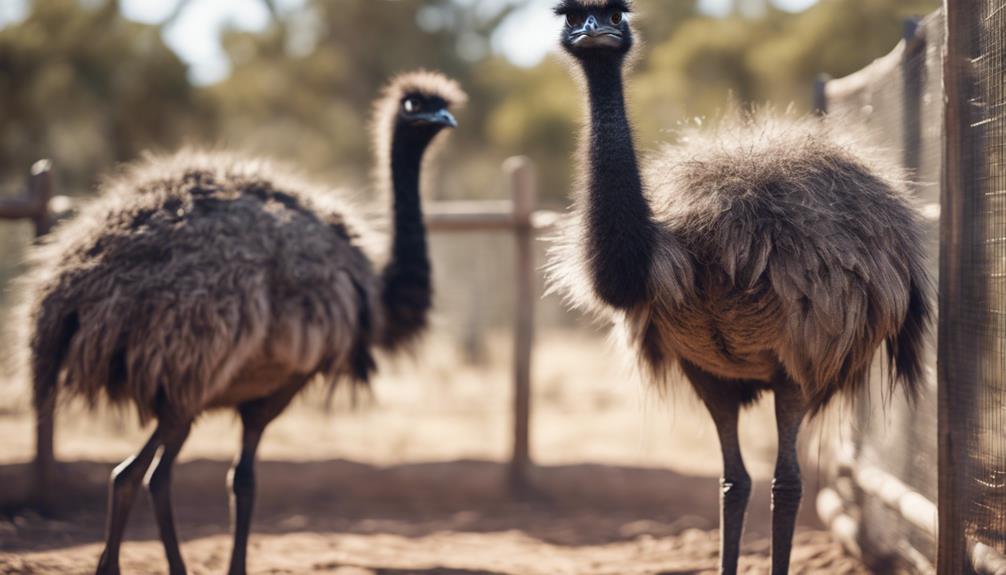
If you've ever considered diversifying your livestock portfolio, you might want to ponder the intriguing world of emu farming. The potential for profit is there, but success in this venture requires a solid understanding of the ins and outs of raising these unique birds.
From their behavior quirks to the financial aspects of running an emu farm, there's much to uncover in this beginner's guide. Before you embark on this journey, you'll want to grasp the essentials to set yourself up for success in this specialized field.
Key Takeaways
- Emus offer profit potential through lean meat, oil, and feathers.
- Understanding emu behavior aids in creating a harmonious environment.
- Regular health checks and grooming routines are essential for emu care.
- Spacious housing, proper nutrition, and marketing strategies are key to successful emu farming.
Benefits of Raising Emus

Raising emus offers numerous advantages for farmers looking to diversify their livestock portfolio. Emus present an exciting profit potential due to the increasing market demand for their lean meat, rich oil, and exquisite feathers. Conducting a thorough cost analysis is crucial before diving into emu farming, as it requires significant initial investment. However, the investment returns can be substantial if managed effectively.
Emu meat is gaining popularity as a healthy alternative, low in fat and cholesterol, appealing to health-conscious consumers. The market demand for emu products continues to rise, providing a promising opportunity for farmers. Understanding the cost dynamics and potential profits is essential for making informed decisions in this industry. Emu farming can be a lucrative venture for those willing to invest the time and resources needed to succeed in this niche market. By carefully evaluating the costs and expected returns, farmers can position themselves to capitalize on the growing demand for emu products.
Understanding Emu Behavior
Understanding the behavior of emus is essential for successfully managing these unique birds in a farming setting. Emus are highly social creatures that rely on specific communication signals to interact with one another.
Here are three key aspects to consider when delving into the world of emu behavior:
- Emu Communication Signals: Emus use a variety of vocalizations, body postures, and movements to communicate within their social groups. Understanding these signals can help you interpret their needs and emotions, leading to better care and management practices.
- Emu Social Dynamics: Emus form complex social structures within their groups, establishing hierarchies and bonds with other members. Observing their social dynamics can provide valuable insights into their behavior and help you create a harmonious environment for your emus.
- Behavioral Responses: Emus exhibit distinct behavioral responses to different stimuli, such as fear, curiosity, or aggression. Being attuned to these responses can help you anticipate their reactions in various situations and ensure their well-being on the farm.
Selecting Healthy Emu Chicks

When selecting healthy emu chicks for your farm, prioritize examining their physical condition and observing their behavior to ensure a strong start in your emu farming venture. Healthy emu chicks are the foundation of a successful breeding program and can help prevent disease outbreaks in your flock. Here are some key points to consider when choosing emu chicks:
| Physical Condition | Behavior |
|---|---|
| Bright eyes and alertness | Active and curious |
| Smooth feathers without bald patches | Eating and drinking regularly |
| Straight legs with no deformities | Interacting with other chicks |
| Clean vent area | Vocalizing softly |
| Proper weight for age | Avoiding aggressive behavior |
Setting Up Emu Enclosures
To ensure the well-being and safety of your emus, constructing proper enclosures is essential for their health and security on your farm. When setting up emu enclosures, consider the following:
- Enclosure Design: Emus require spacious areas to roam and exercise, so design enclosures that offer ample space for them to move around freely. Ensure the fencing is sturdy and tall enough to prevent escape.
- Predator Protection: Protect your emus from predators by installing secure fencing that prevents access from potential threats like foxes, dogs, and other animals. Regularly inspect the perimeter for any vulnerabilities.
- Maintenance: Regularly clean and maintain the enclosures to ensure a hygienic environment for your emus. Check for any wear and tear in the fencing or structures and promptly repair any damages to prevent escapes or injuries.
Feeding and Nutrition Requirements

Proper nutrition plays a crucial role in maintaining the health and productivity of your emus on the farm. Emus have specific feeding schedules and dietary requirements that you must adhere to for their well-being. Emus are primarily grazers, feeding on a variety of plants, insects, and small vertebrates. To replicate this diet in captivity, provide them with a balanced commercial emu feed. Additionally, supplement their diet with fresh fruits and vegetables to ensure they receive essential vitamins and minerals.
Watering needs are equally important. Emus require a clean and constant water supply. Ensure that water sources are easily accessible to them at all times. Emus have unique grazing habits, so observe their behavior to understand their preferences. It's advisable to consult with a veterinarian or an experienced emu farmer to develop a feeding plan tailored to your specific flock's needs. By meeting their nutritional requirements, you can help your emus stay healthy and thrive on your farm.
Emu Health and Care Basics
Maintaining the health and well-being of your emus on the farm requires attention to their basic care and health needs. Here are three essential aspects to consider for keeping your emus healthy and happy:
- Regular Health Checks: Keeping a close eye on your emus' health is crucial. Watch for signs of illness, injury, or unusual behavior. Have a reliable vet who's experienced in treating emus. Learn basic emu first aid techniques to provide immediate care when needed.
- Proper Grooming: Emus need regular grooming to stay clean and healthy. This includes trimming their nails, cleaning their beaks, and checking for any parasites. Establish a grooming routine to ensure your emus are comfortable and free from any grooming-related issues. Learn effective emu grooming techniques to maintain their well-being.
- Clean Living Environment: Emus require a clean and spacious living environment to thrive. Regularly clean their living quarters, provide fresh water, and ensure proper ventilation. A clean environment will help prevent diseases and keep your emus content and healthy.
Emu Breeding Guidelines

Ensuring the successful breeding of emus on your farm requires careful attention to specific guidelines and practices. When it comes to emu breeding techniques, it's essential to provide a stress-free environment for the emus. Ensure that the male to female emu ratio is balanced, as overcrowding can lead to aggressive behavior and unsuccessful breeding attempts. Additionally, maintain a proper diet rich in nutrients to support the breeding process.
Emu breeding poses unique challenges that you must be prepared to face. Emus are sensitive creatures that can easily get stressed, affecting their reproductive capabilities. It's crucial to monitor their behavior closely and address any signs of distress promptly. Understanding the mating rituals of emus is also vital; male emus perform a mating dance to attract females, so observing and allowing this behavior is essential for successful breeding.
Managing Emu Eggs
To effectively manage emu eggs, prioritize creating a suitable nesting environment that mimics their natural habitat. Emus prefer to lay eggs in secluded areas with soft, sandy ground. Here are three essential tips for managing emu eggs successfully:
- Provide Proper Incubating Techniques:
- Emu eggs require specific conditions for successful incubation.
- Maintain a consistent temperature of around 97-98 degrees Fahrenheit and humidity levels between 25-50%.
- Turning the eggs several times a day is crucial to ensure uniform heat distribution and embryo development.
- Ensure Adequate Egg Storage:
- Store emu eggs in a cool, dry place with a consistent temperature.
- Avoid extreme temperature fluctuations that could harm the embryos.
- Check the eggs regularly for any signs of damage or contamination.
- Consider fertility tips such as marking each egg with a date to track viability.
- Monitor Hatching Success:
- Keep a close eye on the eggs during the incubation period.
- Look for signs of development such as veining and candling to monitor progress.
- Prepare for hatching by ensuring a safe and warm environment for the chicks once they start to emerge.
Emu Chicks' Growth Stages

Creating a suitable environment for emu chicks' growth stages is essential for their healthy development after hatching. Emu chick bonding and socialization begin immediately, as they imprint on their caretakers.
Providing a warm, draft-free brooding area with proper bedding and adequate space is crucial for their comfort. Emu chicks grow rapidly, doubling in size within the first month. Regularly monitoring their growth patterns and milestones, such as feather development and weight gain, is vital.
Ensuring a balanced diet rich in protein is essential for their healthy growth. Emu chicks also require ample space to move around and exercise, promoting muscle development. As they mature, gradually introducing them to the outdoors can help them acclimate to their natural environment.
Remember to handle them gently and spend time with them daily to foster trust and social bonds. By creating a nurturing environment that supports their growth and social needs, you can set your emu chicks up for a thriving future.
Emu Marketing Strategies
For successful emu farming ventures, implementing effective marketing strategies is key to reaching your target audience and maximizing profitability. To help you succeed in promoting your emu products and services, consider the following emotional triggers:
- Social media engagement: Establish a strong online presence by interacting with your audience on platforms like Instagram, Facebook, and Twitter. Share captivating images and stories about your emus to create a connection with potential customers.
- Branding strategies that resonate: Develop a unique brand identity that showcases the quality and care you put into your emu farming operation. Use this branding consistently across all marketing materials to build trust and recognition with your audience.
- Customer testimonials and success stories: Share testimonials from satisfied customers who've benefited from your emu products. Personal stories evoke emotions and help potential buyers envision how your products can improve their lives.
Financial Planning for Emu Farming

Effective financial planning is crucial for the success of your emu farming venture, ensuring sustainable growth and profitability. When starting your emu farm, conducting thorough market research is essential to understand demand and pricing trends. This knowledge will help you develop a comprehensive budget that considers all aspects of your operation, from feed and housing to healthcare and marketing.
Calculating profit margins accurately is vital for making informed decisions about pricing and resource allocation. Regularly reviewing your budget and adjusting it based on your findings will allow you to stay on track financially and make necessary changes to maximize profits.
Moreover, keep an eye out for investment opportunities that can enhance your emu farming business. Whether it's upgrading equipment for efficiency or expanding your product line to capture new markets, strategic investments can lead to long-term financial gains.
Scaling Your Emu Business
To elevate your emu business to the next level, consider implementing strategic growth initiatives that align with market demand and your operational capacity.
- Emu Breeding Techniques: Enhance your breeding program by focusing on genetic diversity and health to produce high-quality emus for various purposes. Implementing modern breeding practices can help increase the productivity of your emu farm.
- Marketing Strategies: Develop a strong online presence and engage with potential customers through social media platforms and targeted advertising campaigns. Highlight the unique selling points of your emu products to attract a wider audience and increase sales.
- Emu Growth Stages and Profitability: Monitor the growth stages of your emus closely to optimize feed efficiency and ensure healthy development. By understanding the profitability of each growth stage, you can make informed decisions to maximize revenue and minimize costs in your emu business.
Frequently Asked Questions
Can Emus Be Trained to Perform Tricks or Tasks?
Emus possess intelligence that allows for training in basic tasks, but they are not typically known for performing tricks. Their social behavior focuses more on interactions within their flock rather than learning specific behaviors for entertainment purposes.
Do Emus Make Good Pets for Individuals or Families?
Emus are not ideal pets for most individuals or families due to their aggressive behavior and specific care requirements. Keeping an emu as a pet could be challenging and potentially unsafe for you and your loved ones.
How Do Emus Interact With Other Animals on a Farm?
Emus are social animals with complex interactions. They can be aggressive towards other animals, especially during mating season. Emus have unique feeding habits, primarily grazing on grass and plants, which can influence their behavior around other farm animals.
What Are Some Common Predators of Emus and How Can They Be Protected?
To protect your emus from predators, employ fortress-like fencing strategies. Enhance security with emu alarm systems and scare tactics. Vigilance is key; safeguard your flock with these measures to ensure their safety and well-being.
Are There Any Legal Restrictions or Regulations for Raising Emus on a Farm?
When raising emus on a farm, you should be aware of zoning laws, permits, health regulations, and fencing restrictions. Make sure to research and comply with all legal restrictions and regulations to run a successful operation.
Conclusion
In conclusion, raising emus for profit can be a rewarding venture for beginners. By understanding emu behavior, selecting healthy chicks, and setting up proper enclosures, you can ensure the success of your emu farm.
With careful financial planning and strategic marketing, you can watch your business soar to new heights. Embrace the unique challenges and opportunities that come with emu farming, and you'll be on your way to reaping the benefits of this exciting industry.




